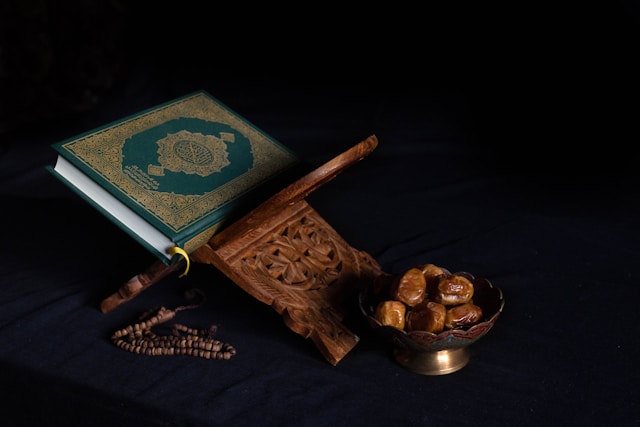As Ramadan ends, many of us wonder: "How can I maintain the upsurge of īmān that I have experienced during Ramadan?" The answer may lie in one of the most beautiful yet overlooked Sunnahs - the six fasts of Shawwal.
🌙 What Are the Shawwal Fasts?
Shawwal is the month that follows the holy month of Ramadan in the Hijri calendar. While Eid al-Fitr marks the end of obligatory fasting, our beloved Prophet Muhammad ﷺ encouraged us to fast six additional days during this month.
📜 The Prophetic Promise
Abū Ayyūb al-Ansārī (may Allāh be pleased with him) reported that the Messenger of Allāh ﷺ said:
"Whoever fasts during the month of Ramadan and then follows it with six days of Shawwal will be (rewarded) as if he had fasted the entire year."
Sahih Muslim 1164Think about this incredible reward! By fasting just these six extra days, Allāh ﷻ multiplies our rewards as if we had fasted an entire year.
Why These Fasts Matter
1. A Sign of Accepted Ramadan
The scholars explain that eagerness to perform good deeds after Ramadan is a sign that Allāh ﷻ has accepted your Ramadan worship. When Allāh ﷻ accepts an act of worship, He guides you to another good deed after it.
وَٱلَّذِينَ ٱهْتَدَوْا۟ زَادَهُمْ هُدًۭى وَءَاتَىٰهُمْ تَقْوَىٰهُمْ
"And those who are guided - He increases them in guidance and gives them their righteousness."
Surah Muhammad 47:172. Mathematical Miracle
There's beautiful wisdom in the reward system:
- Ramadan = 30 days
- Each good deed is multiplied by 10
- 30 days × 10 = 300 days
- 6 days of Shawwal × 10 = 60 days
- 300 + 60 = 360 days ≈ full year!
3. Continuation of Devotion
These fasts show Allāh ﷻ that our fasting wasn't just for Ramadan - it's a worship we're committed to year-round.
🗓️ How to Complete the Six Fasts
Flexible Options:
- Fast six days consecutively after Eid
- Fast Mondays and Thursdays in Shawwal
- Fast the White Days (13th, 14th, and 15th) with three additional days
- Fast any six days throughout the month
Note: You cannot fast on the day of Eid itself, as this is forbidden.
⚡ Maintaining Momentum Throughout the Year
The six fasts of Shawwal are just the beginning! Here are ways to maintain your the ibādah of fasting all year:
Monday & Thursday Fasting
The Prophet Muhammad ﷺ regularly fasted on Mondays and Thursdays. When asked about this, he explained:
"Deeds are presented on Monday and Thursday, and I love that my deeds be presented while I am fasting"
Jami` at-Tirmidhi 747White Days Fasting (Al-Ayyām al-Bēd)
Fasting the 13th, 14th, and 15th of each Hijri month is a highly recommended Sunnah. These days are called "white days" because the moon is at its fullest and brightest.
Qatādah Ibn Malhān al-Qaysī (may Allāh be pleased with him) narrated:
"The Messenger of Allāh (ﷺ) used to command us to fast the white (days): thirteenth, fourteenth and fifteenth of the month. He said: This is like fasting an entire year."
Sunan Abi Dawud 2449Benefits of Year-Round Fasting:
The primary benefit of fasting it to attain Taqwāh, a sense of awareness and responsibility before Allāh ﷻ. This leads to many benefits, such as:
- Protection from sins
- Improved focus in prayer and dhikr
- Increased compassion for those in need
- Consistent growth of īmān
📋 Your Shawwal Action Plan
- Mark your calendar - Set reminders for your six fasting days
- Start gradually - If six days feels overwhelming, begin with just one or two
- Find a fasting buddy - Accountability makes consistency easier
- Make duā - Ask Allāh ﷻ to accept your fasts and help you maintain consistency
💡Remember: Ramadan is the Training Ground
Ramadan isn't meant to be a temporary spiritual journey towards Allāh ﷻ, but rather a training period that prepares us for year-round devotion. The habits we build during Ramadan — increased prayer, recitation of Quran, ṣadaqah (charity), and self-control — should extend beyond this blessed month.
📖 Beyond Fasting: Continuing All Forms of Worship
Fasting is just one way to maintain our growth of īmān after Ramadan. Consider these other forms of ibādah:
Daily Quran Recitation
Don't let your connection with the Quran weaken after Ramadan. Set a realistic daily goal — even if it's just a few verses or a single page. The Prophet ﷺ said:
"The most beloved of deeds to Allāh are those that are consistent, even if they are small."
Saheeh Al-Bukhārī 6464Qiyām al-Layl (Night Prayer)
If you established the habit of qiyām during Ramadan, strive to continue it:
- Make salah & duā during the last third of the night
- Alternatively, can start with just 2 rakʿats after Isha
- Choose specific nights that suit your schedule
Remember: qiyām is among the most beloved acts of worship to Allāh ﷻ.
Dhikr and Duās
Incorporate daily remembrance of Allāh ﷻ into your routine:
- Morning and evening adhkār
- Make duās during the day
- Sending salawāt upon the Prophet ﷺ
Final Thoughts
The six fasts of Shawwal are a beautiful gift from Allāh ﷻ — an opportunity to multiply our rewards and maintain our connection with Him ﷻ after Ramadan. By embracing this Sunnah and continuing other forms of worship, we demonstrate our sincere commitment and show gratitude for the blessing of Ramadan.
May Allāh ﷻ accept our fasting, prayer, and all our good deeds, and may He ﷻ grant us the tawfīq (success) to continue our path towards Allāh ﷻ throughout the year. Amēn.
